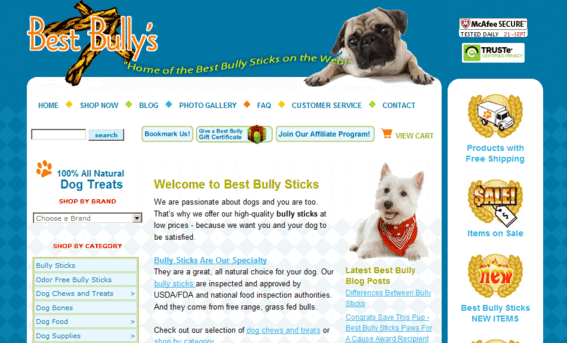“Lessons Learned” is a series where we ask ecommerce business owners to share their experiences. For this installment we visited with Avrum Elmakis, owner and president of Best Bully Sticks, an online store based in Richmond, Va. that sells all natural dog treats and chews.

Best Bully Sticks home page.
Elmakis and his wife Lauren started their online enterprise in 2005 to serve a potential niche market in the pet treat industry. “We have two dogs of our own and we were spending a large amount of money on dog treats and dog chews for them at traditional pet stores and I just thought, ‘Gosh, this is costing us a fortune. There are probably other people out there like us.’ And, that’s really how we got started.”
At the time, Avrum and Lauren were both working full time in the medical and pharmaceutical sales industry, so they started out selling just a few items on eBay. “It wasn’t until eBay sent us an email from a new venture called ProStores [an eBay-owned shopping cart] that we really thought about having our own website,” he said.
Today Best Bully Sticks stocks roughly 500 SKUs, with gross revenue from $3 to $10 million per year for it and three other sites. “We now have four sites dedicated to the pet field and about 60,000 customers, but it’s not something that we publicly advertise,” said Elmakis.

Avrum Elmakis
“There are completely different client bases. We’ve found that there are certain consumers that are very focused on the green movement, so we try to have a vertical geared specifically to those folks. Then we found earlier that there are certain customers out there that are only buying on price, so we have a vertical dealing specifically with those folks. Maybe it’s the colors on the page or whatever, but certain people prefer to purchase from one place over the other for really no reason other than they just have a preference to that thing or company.”
Shopping Cart
“We started as a ProStores store, which is basically an ecommerce store driven by eBay. It gives you some integration tools that let you go back and forth with your items into their platform and it was great. It worked well for us for the first six months of our business, until we got to a point where we wanted some level of customization, because it was evident we were going to be here for a while.
“We didn’t feel like ProStores had enough customization in that package. So we went over to MightyMerchant, which we’re still currently with. We really enjoy our relationship. They do our hosting, they do our security, and they do a lot of graphic work. It was kind of a holistic move for us to go with them. And, as I’ve learned and grown over the years acquiring other companies or starting new businesses, the shopping cart really does make a tremendous difference in your ability to be successful.”
Payment Gateways
“We use a pretty traditional setup. We work with Authorize.Net as our payment gateway, and we accept PayPal payments. That’s really the extent of it. The one thing I would encourage business owners to do routinely as an online vendor is to go back to your folks about three times a year and try to renegotiate your rate, especially if you’re on a growth curve. That will be a significant savings in the long run.”
Fulfillment
“We do all of our fulfillment. We have our warehouses in Richmond, Virginia. We primarily manage orders through the shopping cart, but we’ve got a pretty heavy integration with UPS as our primary shipper. We do some shipping with U.S.P.S. for small packages below one pound. The integration is pretty seamless with MightyMerchant where we can trigger most order fields to move into the shipping platform and generate a label pretty quickly.
“We stock 98 percent of our inventory. For large heavy items, like huge vacuums for a grooming shop, we drop ship. But 98 to 99 percent of our items are done in-house.
“A lot of the inventory is common and shared inventory [between the four sites we own], but we do have some segments in our warehouse that are dedicated specifically to different verticals. A company focused only on dog treats and chews isn’t going to be very heavy into the dog spa section, so we kind of keep that a little bit isolated.”
Shipping
“We’ve got all the options that UPS offers from ground to expedited services. Then we’ve got what we call an economy option, and we’ve also got free shipping. So we’ve basically got three categories. If a customer were to pick something in the free shipping category, it’s at our discretion how we choose to ship it. So, we can choose either the U.S.P.S. or UPS. If they choose our economy option (which is a special thing that we set up with UPS), it’s a prolonged service time. It’s a three to eight business days service time, as opposed to a one to five business service time, and we’re able to do that at a discounted rate.
“We don’t offer free shipping across the board. We’ve looked at it so much over the years, and I get the philosophy. It was always that free shipping really isn’t free. People that are offering free shipping build that shipping cost into the cost of the item. We just decided early on that it would be better for us to just put our market price out there and then let shipping be actual shipping. It has worked very well for us.”
“Now, for the items that we do offer free shipping on, very specifically, are items maybe we want to move in great volume, or we’re having a special sale or a promotion. So we reserve that for particular items that fall into that category for a very specific reason. We don’t have any offers of free shipping over $99, or free shipping over $49, or whatever.
“There are definitely folks that specifically look for free shipping and we kind of segmented our customers into different buying categories. There is a category of buyers out there that is buying solely on price and shipping built-in, and we’ve kind of created that to market directly to those folks.”
Employees
“We’re a team of eight employees that works in order fulfillment and shipping. They’re all full-time employees. My wife mainly works with our vendors now. She used to be doing all kinds of different stuff, but her main capacity now is the vendor relationship and new product development. We also have a customer service position who handles phone ordering and data entry, customer service.”
Social Media
“We subcontract all of our technical writing, blog writing and social marketing out to two different third party agencies. Those folks help us with the marketing across the board.
“We are very, very active socially so customers are able to find us on Twitter and Facebook, which are considered kind of our two top tiers in social media.”
Search Engine Optimization
“We are very conscious of SEO writing for our product descriptions and our page titling. That’s very important to do. We started that very early on and then we complemented that with our blog writing. Now we probably have well over 10,000 or maybe 15,000 pages of content that’s very relevant to what we do, and I think that that’s important to keep in mind. We try to think of that on a daily bases in the writing that we do on our blog, and in our outreach with our customers and all those different things.”
Pay-Per-Click Advertising
“We outsource PPC to a third agency. It is another company that MightyMerchant owns, Hero Web.
“Early on, we couldn’t make PPC work with our model because our model is volume-driven, and pay per click is a very expensive form of advertising. But it’s also very effective. So over the years, we’ve developed strategies that we think work very well within our budget and produce the kind of return on ads that we’re looking for. We’ve got around 1,500 to 2,000 keywords.
“We focus on all search engines. We do Google and Yahoo! and Bing. And then we also do comparison-shopping engines like NexTag, Pronto, PriceGrabber.
“We also do Google Shopping. That’s a huge thing, especially for folks starting out. The feed is free advertising (it’s free for us because we just generate it from our shopping cart). So, especially for long tail keywords or long tail items that we sell, we find that that converts really well through the Google Shopping portal.”
Accounting Software
“We use QuickBooks. We’ve found that it’s very easy and straightforward to use. We integrate our shopping cart with a service called T-HUB, which acts as a liaison between shopping carts and accounting software packages. We’ve explored a few different options but we’ve found that QuickBooks is our easiest way to keep things straight.”
Biggest Mistake
“One of my biggest mistakes was my standoffishness towards embracing social media when it first hit. One of the hardest things as an ecommerce business owner is to know what trends you want to jump into, because there’s always something new. As a company, I was about six months late to that game.”
Biggest Success
“We’ve got an amazing team of folks and it’s nice to be able to work with them. Over the years, we’ve been able to do good things, like have benefit programs and 401k and all that kind of stuff that you may not see in a small company. We think that those types of investments in our employees create very tangible results on the backend. So, the best thing we have going for us is our team, and I’d say putting those folks together is one of my biggest successes.”
Final Thoughts
“I would tell a new person starting out to really understand what the customer service and support is like for the different services you get. If it’s a shopping cart or a payment gateway or whatever, you don’t want to get stuck in a situation where you send in a support ticket and you get a response three days later. You want to partner with folks that are very interested in your business and respond very quickly. It’s great to have infrastructure in place to respond to an issue very quickly. That is a huge key to success.”




